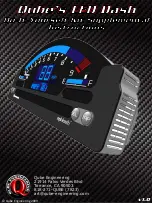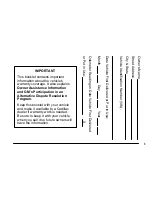
Jump-Starting Procedure
• Connect the positive
(+)
end of the jumper cable to the positive
(+)
post of the
discharged vehicle.
• Connect the opposite end of the positive
(+)
jumper cable to the positive
(+)
post of the booster battery.
• Connect the negative end
(-)
of the jumper cable to the negative
(-)
post of the
booster battery.
• Connect the opposite end of the negative
(-)
jumper cable to a good engine
ground (exposed metal part of the discharged vehicle’s engine) away from the
battery and the fuel injection system.
• Start the engine in the vehicle that has the booster battery, let the engine idle a
few minutes, and then start the engine in the vehicle with the discharged
battery.
Once the engine is started, remove the jumper cables in the reverse sequence:
• Disconnect the negative
(-)
jumper cable from the engine ground of the vehicle
with the discharged battery.
• Disconnect the negative end
(-)
of the jumper cable from the negative
(-)
post
of the booster battery.
• Disconnect the opposite end of the positive
(+)
jumper cable from the positive
(+)
post of the booster battery.
• Disconnect the positive
(+)
end of the jumper cable from the positive
(+)
post
of the discharged vehicle.
• If frequent jump-starting is required to start your vehicle you should have the
battery and charging system inspected at your authorized dealer.
CAUTION!
• Do not use a portable battery booster pack or any other booster source with a
system voltage greater than 12 Volts or damage to the battery, starter motor,
alternator or electrical system may occur.
• Failure to follow these procedures could result in damage to the charging
system of the booster vehicle or the discharged vehicle.
• Accessories that can be plugged into the vehicle power outlets draw power
from the vehicle’s battery, even when not in use (i.e., cellular phones, etc.).
Eventually, if plugged in long enough, the vehicle’s battery will discharge
sufficiently to degrade battery life and/or prevent the engine from starting.
WARNING!
• When temperatures are below the freezing point, electrolyte in a discharged
battery may freeze. Do not attempt jump-starting because the battery could
rupture or explode and cause personal injury. Battery temperature must be
brought above the freezing point before attempting a jump-start.
(Continued)
WHAT TO DO IN EMERGENCIES
76
Summary of Contents for Trucks 1500
Page 1: ...USER GUIDE USER GUIDE RAM TRUCKS 1500 2500 3500 RAM TRUCKS 1500 2500 3500 2011...
Page 6: ...DRIVER COCKPIT CONTROLS AT A GLANCE 4...
Page 7: ...CONTROLS AT A GLANCE 5...
Page 32: ...YOUR VEHICLE S SOUND SYSTEM ELECTRONICS 30...
Page 33: ...ELECTRONICS 31...
Page 85: ...ENGINE COMPARTMENT 3 7L Engine MAINTAINING YOUR VEHICLE 83...
Page 86: ...4 7L Engine MAINTAINING YOUR VEHICLE 84...
Page 87: ...5 7L Engine MAINTAINING YOUR VEHICLE 85...
Page 88: ...6 7L Diesel Engine MAINTAINING YOUR VEHICLE 86...
Page 109: ...NOTES 107...
Page 110: ...NOTES 108...
Page 111: ...NOTES 109...
Page 112: ...NOTES 110...
Page 113: ...NOTES 111...
Page 114: ...NOTES 112...
















































